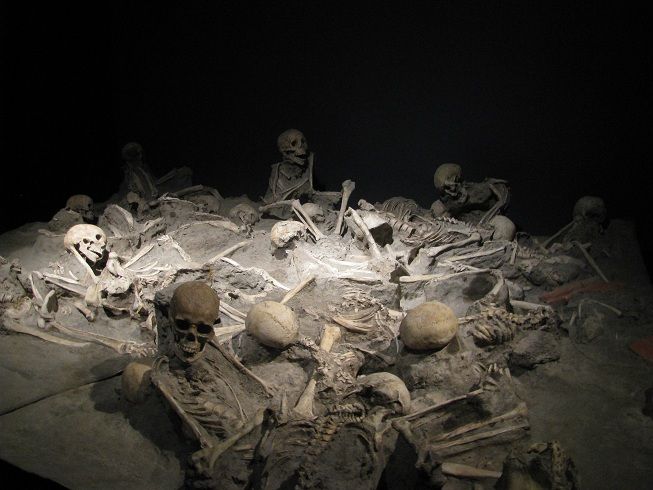
Yesterday I visited Herculaneum, the other city destroyed by the eruption of Vesuvius that buried Pompeii. It’s much smaller, having been buried not by ash but by volcanic mud, which dries like concrete and makes excavation much more difficult. It’s also smaller because it is under a suburb of Naples, and enlarging it would require tearing down the structures above it.
It’s a sobering place, especially for the heaps of human bones found in the boathouses along the old sea wall—people caught by toxic gas as they frantically tried to escape by boat—Or perhaps just made a futile attempt to hide.
The excavation goes down thirty meters or so below the current ground level of the city built over the centuries atop the cooled and solidified mud. Since it has been a very wet spring, rain water has pooled, forming a temporary moat in the space between the restored site and the unexcavated mud rock.
As I stood looking at the bones and skulls protruding from the chalklike substance in each of the boathouses, at my back from the moat, I heard the mating calls of thousands of frogs that hopped and swam among the grasses of the moat. Such a strong disconnect between the living and the dead, although, of course, the frogs have no idea of the significance and gravity of the place they inhabit.
As well it should be. Their world is the water and the grasses. Their sense of time does not go much beyond the desire to mate as soon as possible. Vesuvius, Herculaneum, Italy—none of it matters, nor do these brightly clothed creatures (including me) watching them.
I was reminded of one of my favorite writers, naturalist Loren Eiseley, who once wrote of hearing frogs at night while camping. “Every spring in the wet meadows and ditches I hear a little shrilling chorus which sounds for all the world like an endlessly reiterated ‘We’re here, we’re here, we’re here.’”
That’s exactly what the frogs were singing at Herculaneum. Eiseley adds, “I suspect that to some greater ear than ours, man’s optimistic pronouncements about his role and destiny may make a similar little ringing sound that travels a small way out into the night.”
The frogs have their song and I have my own, which sounds much like his. The people whose bones we honor at Herculaneum, whose world we do our best to uncover, were once intensely here, making their calls into their world, to be noticed, cared about, chosen. Their desire to matter went out as wishes into the universe, as ours do.
“From the heights of a mountain, or a marsh at evening, [the frog song] blends, not too badly, with all the other sleepy voices that, in croaks or chirrups, are saying the same thing.”
Like the Ancient Romans. Like me. Like us.
